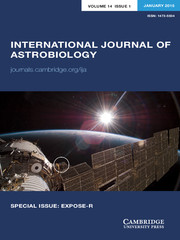The fourth conference of the Astrobiology Society of Britain (ASB) (http://www.astrobiologysociety.org) was held at Royal Holloway College London University (http://www.rhul.ac.uk/), from 7 to 9 April 2010. The organizer of the meeting was Dr David Waltham, the Head of the Department of Earth Sciences at Royal Holloway. The attendees were greatly impressed with the beautiful campus and obvious high quality of the Earth Sciences department in which the meeting took place and who helped sponsor the meeting (along with our regular sponsor the Science and Technology Facilities Council (STFC)). Over 60 people attended the meeting, and they submitted 44 abstracts that yielded 33 talks and 12 posters (someone brought an extra poster). Although primarily a national meeting, nine of the 44 abstracts came from overseas. As usual at ASB meetings, there were a number of sessions on a wide set of astrobiological themes, ranging from planets, such as Mars, to extremophiles, how to detect life, habitability (including exoplanets), the origin of life and how to detect life.
There were several guest speakers at the meeting, including Professor Euan Nisbet (Royal Holloway) on the evolution of the Earth's atmosphere and Dr Giovanna Tinetti (University College London) on characterizing extra solar planets. The meeting also heard a talk from Dr Lewis Dartnell about his recent survey of astrobiology in the UK (Dartnell & Burchell Reference Burchell2009). This important survey stands as an indicator of the strength of astrobiology in the UK, finding evidence for some 280 researchers in 33 research groups. Of similar interest, a quick poll in the lecture theatre after Lewis' talk revealed the composition of the audience to be Physics/Astronomy 13%, Biology 30%, Chemistry 17%, Earth Science 30% and other 9%, with about 30–40% of attendees being female. Clearly the field is a multi-disciplinary one with, what for some sciences, is a strong female representation.
As a preamble to the meeting proper, and to aid in public engagement with science, David Waltham and Lewis Dartnell arranged a half-day session of activities for 16–17-year-old school children. As well as talks, this included a look at Astrium's full-sized mobile model of a Mars rover for the future European Space Agency (ESA) ExoMars mission (many thanks to Astrium and Dr Ellie Allouis and colleagues for this).
The conference dinner was held in the stunning picture gallery of Royal Holloway (http://www.rhul.ac.uk/visitors-guide/picture-gallery.html). This setting greatly enhanced the many discussions that took place over the meal. A committee meeting of the ASB took place during the conference and I stood down as Chair of the Society after back-to-back two-year terms of office. I wish my successor (Dr Terry Kee, Leeds University) well with his new position. I also want to thank all those who work so hard for the Society, as well as STFC for helping sponsor these biennial conferences.
As ever, the Society is pleased that selected papers from the meeting are appearing in a special issue of this journal (joining special issues from our previous meetings, see Burchell & Edwards Reference Burchell and Edwards2004; Burchell Reference Burchell2006, Reference Burchell2009). It is important that such meetings produce original research papers of publishable quality and we feel that yet again the papers contained herein achieve this.


